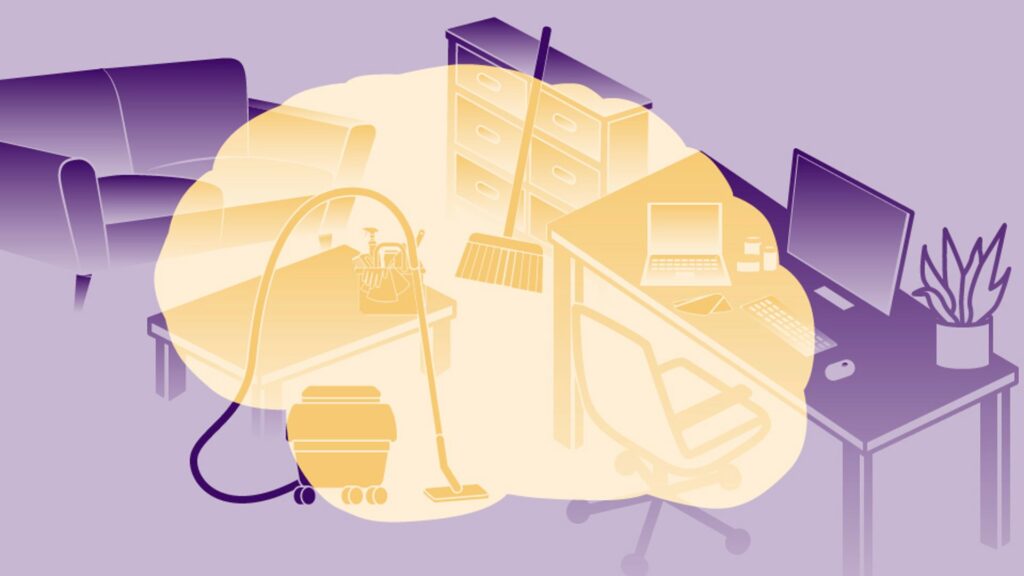Clear space, clear mind

From overflowing desks to dishes piled in the sink, the clutter around us can weigh heavily on our minds, leading to increased stress, decreased productivity, and a sense of overwhelm.
Verywell Mind noted that: “To the brain, clutter represents unfinished business and this lack of completeness can be highly stressful for some people.” Clutter and mess can create feelings of anxiety but by cleaning and organising, we can create a more relaxing environment that helps us to feel calm and focus on daily tasks.
Having dust and dirt settle in our work and living space can also aggravate our respiratory system, so clearing up our space also clears the air that we breathe.
Benefits of cleaning and decluttering:
- Helps you gain a sense of control over your environment
- Provides a sense of accomplishment and satisfaction which translates into motivation
- Can reduce feelings of stress and anxiety
- Can reduce fatigue and improve concentration
Challenge yourself to declutter your workspace and home
- Start small – Set aside dedicated time each day to tackle a specific area, whether it’s your desk, kitchen, or living area. Break tasks into manageable chunks to prevent overwhelm and celebrate accomplishments along the way.
- Set a timer – Set a timer for 10 or 20 minutes and tidy as much as you can in this time, once the timer stops, you can relax. This can help if you feel overwhelmed and are unable to devote much time to cleaning.
- Ask for help – You might be in a situation where you feel like cleaning is not a task you can tackle alone, in this case, consider asking friends or family to help you.
- Donate things you don’t need – Giving to others can also boost your happiness and create a sense of reward.
- Make it fun – Listen to upbeat music or a podcast, take before and after pictures of your space, and treat yourself for working hard.
- Aim to make decluttering an ongoing practice – Regular maintenance is key to sustaining a clutter-free environment and reaping the mental health benefits it offers.
When working in shared office space, it’s also important to be mindful of other people’s wellbeing too. If you have been working on a hot desk or using a shared space, make sure you leave it clean and tidy for the next person to use.
A great method to follow for decluttering is Marie Kondo’s ‘KonMari Method’ which encourages discarding items that don’t “spark joy” and tidying by category rather than by location. If you want to see the KonMari Method in practice, check out the Netflix series ‘Tidying Up with Marie Kondo’.
Some members of Loughborough University staff discussed their thoughts on decluttering:
Sarah Van-Zoelen, Specialist Occupational Health and Wellbeing Nurse Manager commented: “I love declutter dollies, I find that I cannot be effective, focused or be able to relax if my environment is messy and cluttered. We all live with lots of stuff, but there is definitely a ‘tipping point’ when things get out of hand and the only way to rebalance is to sort the environment that I live and work in.”
Stephanie White, Development Manager (Trusts and Foundations) said: “Selling some of my clothes and things on places like Vinted has also made me more mindful of what I buy going forward, and improved my wellbeing as I can see a clear difference in my living space by removing the clutter.”
Sarolta Batki, People Development Officer at Loughborough Sport, also commented: “I have been involved in an organised office clear up more than once. Getting together and making decisions on where to store what, how to use the storage space, what needs getting rid of, what could we buy/replace in the office to help with work/productivity, even hoovering up and cleaning the desks together is really empowering.
“I mean this in the sense that for a lot of your job, you are told what to do – but having some autonomy on making your workspace comfortable and nice for yourself is at least giving you some control and is hugely beneficial for your wellbeing at work.”
Remember that there may be times when things won’t go as planned and you might not be able to tidy up, so make sure you have other tools that you can use to destress and unwind. You can find self-care tips on our stress awareness blog.
Health and Wellbeing
Wellbeing means being in a positive physical, social and mental state. Wellbeing is important to us as happy, healthy people who achieve harmony in their work / life mix are more creative, productive and help to create a great place to work.